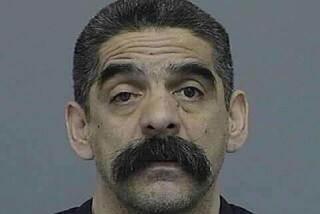U.S. Attempts to Enjoin Bonanno Mafia Family : In Unprecedented Action, Suit Asks Members Be Stripped of Holdings, Blocked From Future Deals
WASHINGTON — Federal prosecutors Wednesday launched an unprecedented attack on the far-flung business operations of a leading Mafia “family,” seeking to strip its interest in a Teamster local, gambling properties, hotels and a taxi company.
In its first attempt to enjoin an entire organized crime unit, the government in a civil lawsuit also urged a federal court to bar members of the Bonanno family from illegal activities, business dealings with each other and from “making” new members.
The landmark action by U.S. Atty. Andrew J. Maloney in Brooklyn is the broadest action ever attempted under civil provisions of the Racketeer Influenced and Corrupt Organizations Act.
Prosecutions Hurt Mob
“This action builds on and complements several successful criminal prosecutions” of members of the Bonanno family, Maloney said. “The prosecutions hurt the mob by putting its members in jail. This lawsuit will deprive the Bonanno family of its very means and ends of operation, its money . . . a new front in the battle against this 50-year-old criminal empire.”
The 71-page complaint, drawing on an extensive FBI investigation, also seeks to oust the leadership of Teamsters Local 814 in New York, allegedly handpicked by the Bonanno family, and to replace it with a court-appointed trustee.
The Bonanno-dominated union allegedly prospered from a contract bid-rigging scheme that involved, among other jobs, the FBI’s $150,000 relocation of its New York field office in 1978, according to the lawsuit.
“This is the way you can break a mob family,” said Peter R. Ginsberg, an assistant U.S. attorney handling the case. He predicted that, if successful, the civil suit would be copied widely in the fight against organized crime.
Although the government has won convictions of individual Bonanno members, the family still allegedly controls many legal and illegal operations, which are the target of the lawsuit.
Contempt Citations
If the government wins, the 13 Bonanno family members--including alleged boss Philip Rastelli, the underboss, consigliere , capos and soldiers--would face contempt citations, punishable by indefinite jail terms, if they engaged in the barred activities. The suit, which will go to trial in federal court after lengthy pretrial proceedings, also would assess $1 million in damages against the defendants.
The suit listed 196 acts of racketeering by Bonanno family members, including gambling, narcotics trafficking, theft from interstate commerce, loan-sharking, interference with commerce and labor racketeering.
Stanley Teitler, Rastelli’s lawyer, said that the suit “violates the First Amendment insofar as it seeks to restrain people from associating with one another and earning a living.”
“It’s not illegal in our country to be a member of the Communist Party or an organized crime family. The crime is a commission of a criminal act,” Teitler said. He did not acknowledge that Rastelli, who is serving a 12-year sentence at the federal prison at El Reno, Okla., for labor racketeering, is boss of the Bonanno family.
In addition to replacing Teamster Local 814’s leadership, the suit asked the court to forfeit three New York City gambling properties that it alleged the family used for slot machines, card games and sports bookmaking, grossing millions of dollars a year.
The complaint alleged that three New Jersey hotels and the Big Apple Taxi Two Way Radio Co. in Brooklyn were purchased or are being operated with money derived from the family’s racketeering enterprises. The government asked that the owners of the businesses be divested of their interests and that receivers be appointed pending divestiture.
Criticized on Limited Use
The Justice Department has been criticized for its limited use of the civil Racketeer Influenced and Corrupt Organizations Act sanctions, which Congress approved in 1970. Two union locals have been placed in trusteeship under this authority, and the Justice Department is planning a sweeping civil action to replace the entire leadership of the International Brotherhood of Teamsters.
But the Bonanno family suit marks the most sweeping action actually brought to court.
RICO civil provisions give prosecutors several advantages that they would not have in a criminal proceeding. For example, prosecutors can establish guilt with only a preponderance of the evidence--much easier to prove than guilt beyond a reasonable doubt, the standard in a criminal trial.
In addition, they can force a defendant to testify or face a negative inference being drawn from his refusal, an inference that cannot be drawn in a criminal case. Defendants are required to answer questions under oath in civil cases, a power not available to prosecutors in criminal cases.
More to Read
Sign up for Essential California
The most important California stories and recommendations in your inbox every morning.
You may occasionally receive promotional content from the Los Angeles Times.










